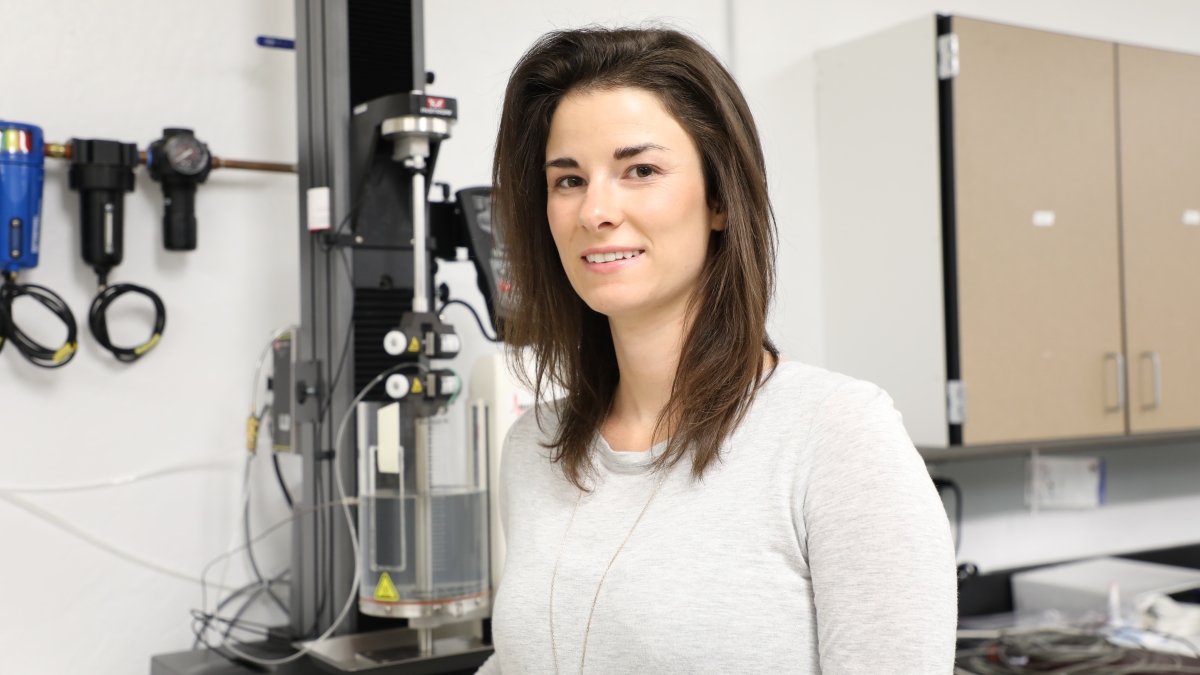ASU chemical engineer honored for celebrating women in the field

Fulton Schools Assistant Professor Julianne Holloway is passionate about promoting the development and recognition of women in chemical engineering. Her efforts are being recognized with the American Institute of Chemical Engineers Herb Epstein Award for Technical Programming. Photo by Michelle Saldana-Chiago/ASU Biodesign Institute
Julianne L. Holloway, an assistant professor of chemical engineering at Arizona State University’s Ira A. Fulton Schools of Engineering, is being honored with the American Institute of Chemical Engineers (AIChE) Herb Epstein Award for Technical Programming.
The award recognizes Holloway’s efforts in organizing a one-day symposium to celebrate the 20th anniversary of the AIChE Women’s Initiative Committee. The committee promotes the entry, development and participation of women in AIChE and the chemical engineering profession.
“I’m incredibly grateful and surprised to receive the AIChE Herb Epstein Award,” Holloway said. “I appreciate the recognition of the time and effort involved in planning the symposium.”
The AIChE Women’s Initiative Committee 20th anniversary symposium highlighted the significant contributions of women to chemical engineering. The symposium featured more than 20 female speakers from diverse research backgrounds and affiliations, ranging from rising stars in the profession to pioneers in the field.
Speakers also included more than 10 AIChE Fellows, four past chairs of the Women’s Initiative Committee and four past, present or elected presidents of AIChE.
In planning the event, Holloway raised $20,000 from the AIChE Foundation and assembled a team of co-chairs and advisers to select guest speakers through a two-round voting process. She also helped solicit speaker suggestions and compiled the speaker selection pool of more than 200 highly qualified female chemical engineers from academia and industry at different career levels.
“The Women’s Initiative Committee has been immensely valuable to so many women in chemical engineering over the past 20 years,” Holloway said. “Many speakers shared their emotional stories detailing the difficulties and triumphs of female chemical engineers and how the committee positively impacted their lives and their careers.”
Planning the symposium was especially important to Holloway because the committee served as a cornerstone in her development as a chemical engineer. She started attending AIChE meetings as an undergraduate, continued throughout her doctoral degree studies and remained involved after joining the chemical engineering faculty in the School for Engineering of Matter, Transport and Energy, one of the six Fulton Schools.
“The committee was instrumental in providing professional development workshops as well as a community for me to network and receive mentorship,” she said. “Due to its impact on my career, I wanted to do something special for the committee’s 20th anniversary and the idea of an all-day symposium highlighting some of the amazing women in chemical engineering seemed perfect.”
Beyond Holloway’s contributions to the symposium, she has been very involved in the committee for the past several years. She served as the programming chair for fall 2017, making her responsible for creating career development programs for undergraduate students, graduate students and other young professionals. Additionally, she has participated in various AIChE service efforts.
Holloway will receive the Herb Epstein Award at the 2019 AIChE Fall Meeting, held Nov. 10–15 in Orlando, Florida.
The executive board of the program committee presents this award, established in the summer of 2007, in memory of Herbie Epstein's many contributions and long years of service to AIChE and technical programming.
“AIChE has been very supportive of women in chemical engineering,” Holloway said. “The Herb Epstein Award is one more symbol of that support.”
More Science and technology

Lucy's lasting legacy: Donald Johanson reflects on the discovery of a lifetime
Fifty years ago, in the dusty hills of Hadar, Ethiopia, a young paleoanthropologist, Donald Johanson, discovered what would…

ASU and Deca Technologies selected to lead $100M SHIELD USA project to strengthen U.S. semiconductor packaging capabilities
The National Institute of Standards and Technology — part of the U.S. Department of Commerce — announced today that it plans to…

From food crops to cancer clinics: Lessons in extermination resistance
Just as crop-devouring insects evolve to resist pesticides, cancer cells can increase their lethality by developing resistance to…